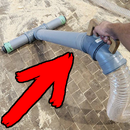Introduction: Wooden Window Sill
First of all, Happy 2021!
In this article, you will learn how to build and install a wooden window sill!
It is really nothing complicated. A few power tools are needed but other than that it is a pretty simple project. I hope it helps you if you are wondering how to build one.
Of course, there are ready-made window sills on the market. Sadly they all tend to be made out of unnatural materials which is a big no-go for me. There is already enough plastic on this Earth so why not put in some effort and make window sills from wood?! It will certainly feel a hundred times better to a touch and make the room feel much cosier.
Let´s get started!
⇩⇩Be sure to watch the video if you prefer more of a visual presentation!⇩⇩
Step 1: Tools and Materials
Tools needed:
- Circular saw - preferably on a track
- Jig saw
- Random orbital sander (or a similar sander)
- Measuring and marking tools
- Wood plane or coarse sandpaper
- Caulking gun
- Hammer
Materials needed:
- Wood - I used a glued up board of ash. This is readily available material in my area. It costs around 100€ per slab, is 31 mm thick, has no defects and is already nicely sanded. I used around 1/4 of the board so it cost maybe 15€ per sill. And it has probably one of the nicest colour and grain that I know. It is perfect for something like this! Of course, a solid piece of lumber could also be used but that probably requires a jointer and a planer. Plywood is also an option.
- Caulking
- Wood finish - Osmo transparent Topoil in my case.
Step 2: Measure and Cut
I measured the opening where the sill will be. I had managed to build the walls somewhat straight so everything was pretty close to square (nothing a bit of caulking could not hide). If the walls would have been crooked I would have had to make a template from thin plywood or cardboard.
To make the straight cuts I used my track saw (my favourite tool!). The little squares on the ends were cut using a jig saw. Since the material was quite thick (31mm) and dense the blade started to wander and made a crooked cut. To avoid this I cut most of the material with a circular saw and then just finished off the cut with a jig saw. This gave satisfactory results.
I did cut the sills pretty precise. I am not worrying about the wood movement too much since ash is a pretty dense wood and it does not expand too much in longitudinal direction anyway. It can still easily expand in the tangential direction.
Step 3: Adding the Chamfer
I do not really know if this step is a must.
If you have ever done some welding you probably know that it is a good idea to chamfer both edges before welding them. This results in a much stronger and nicer weld. Well, I thought why not give it a try on a window sill. The chamfer was made using a wood plane. If you do not have one then I think coarse sandpaper on a solid sanding block works as well. The end result came out pretty nice so I think it worked. You can see more in the Caulking step.
Step 4: Round Over the Edges
This is really a personal preference. I decided to round over the two sharp corners. I did not make the roundover a specific size. I just used the first round object near me - the inner circle of electrical tape. Most of the material was cut using a jig saw. The rest was removed using an orbital sander and 100 grit sandpaper.
Step 5: Sand and Finish
Next up, I sanded all the visible surfaces first with 100 and then with 180 grit. That left a pretty smooth surface. There were some burn marks from a circular saw. I removed those with a hand plane but rougher sandpaper would have done the same.
For the finish, I used Osmo transparent Topoil. This is a good quality finish and it really popped the colours and the grain of the wood.
Step 6: Install
Before adding the adhesive it is a good idea to try it out one last time to avoid any surprises. I used some leftover heat-proof (of course it does not have to be) adhesive from my Wood Stove Podium project. I applied quite a few thick beads to ensure good adhesion. The sill was installed and tapped with a hammer and a waste block (to avoid dents).
All the edges were caulked. I really do not have the patience to tape everything so I just used a soapy finger to push in the caulk and hope for the best. I am quite satisfied with the results I get but it does require some practice.
Step 7: The End
Like always, I hope you enjoyed this article and learned something from it. If you have any questions or comments please do leave them down below.
As always, have a wonderful day!
Andu
PS: If you enjoyed the article and video please consider subscribing! Thanks!




